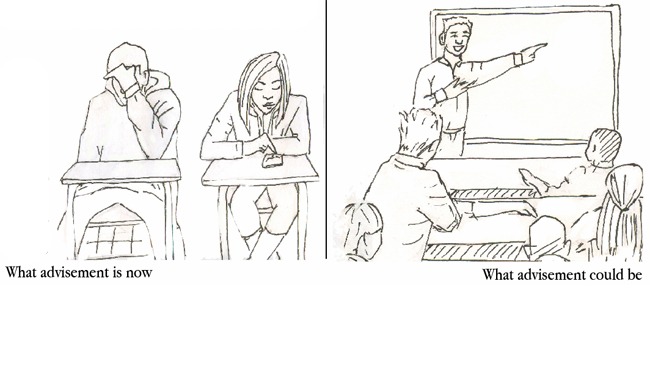By ETHAN CRANE – Viewpoints Writer
You walk towards the room. A few kids stand in the hallway right outside the door. Inside, some students have their heads down, some have their headphones on and some work furiously to finish their homework. Few speak to each other. The teacher tries to call the attention of the class to no avail.
Every Monday and Friday, Clarke Central High School students return to their
advisement classrooms for approximately 32 minutes. Many students, however, do not understand the true purposes of this period.
Now in its 12th year, CCHS’ advisement program was one of the state’s first. Ranging from alcohol awareness to registration for the next school year’s classes, the purposes of this period are numerous.
Generally, advisement provides a time for state-mandated programs, such as Georgia College 411, to be completed, as well as a replacement for functions similar to what a homeroom provides. However, many students see this extra 32 minutes as a time to relax.
“(Teachers) have to convince (students) that advisement is going to be beneficial to their future and make them realize that it is an important time of the day, too,” CCHS mathematics department teacher Chris Aiken said. “I don’t think they all realize that. They just think it’s a 30 minute free period.”
By treating advisement as a time to simply sit around, students are ignoring matters, both academic and social, pertinent to their future success.
Advisement classes are generally composed of a heterogeneous mix of students, many of whom do not share classes or social groups throughout the day. It allows the opportunity for students to mingle; however, this opportunity is often foregone.
The assigned activities that advisers must complete with their advisees rarely last longer than half the 32-minute block, so what could be done with the extra 15 minutes?
Rather than filling this time with more instruction or academic activities, it could be used to promote a sense of community and companionship among students.
As CCHS transitions to become part of the International Baccalaureate program, it is important that the goals of the program are incorporated into daily student life.
One of the IB’s major goals is to encourage students to grow into lifelong learners and to respect the opinions of others. Advisement provides a time that could be used in a constructive manner to reach this goal.
Specifically, advisement could be used to hold discussions with a diverse group of students over matters that pertain to their futures. Undoubtedly, opinions will differ within the group, providing an early opportunity to foster respect for different viewpoints.
Advisement is ripe with the potential to benefit students in both academic and non-academic ways.
Presently, advisement is just an extra 32 minutes during the day. To students, its purpose is unclear. But it could be a time for students to expand their social horizons, to work towards their education and careers after they leave CCHS and to grow in an intimate community into well-rounded and respectful citizens.
